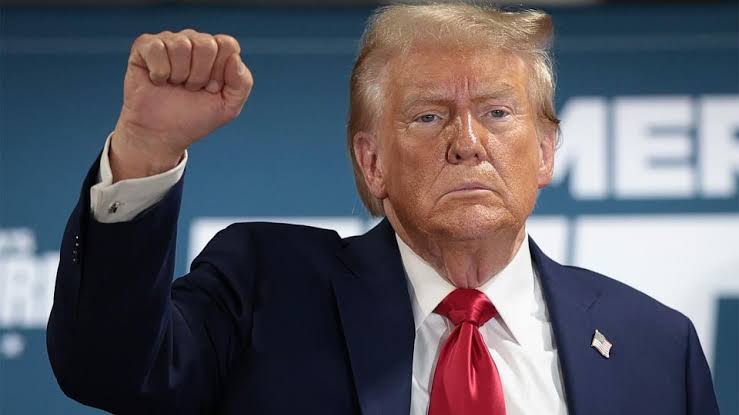
In a move that many political analysts did not foresee, Vice President Kamala Harris and President Joe Biden have publicly congratulated former President Donald Trump, acknowledging his political success and the ongoing principles of a peaceful transfer of power. While this may seem like a diplomatic gesture, it has sparked controversy and raised questions about the future of American democracy, partisanship, and the integrity of the electoral process.
The Context: Why This Congratulatory Statement Came About
The congratulatory remarks from Biden and Harris came after Trump’s unexpected resurgence in national politics. After several years of legal battles, controversies, and media attention, Trump has managed to maintain a strong political base, and despite multiple investigations and the challenge of being impeached twice during his presidency, he has remained an influential figure within the Republican Party.
The statement from Biden and Harris was issued after Trump delivered an address emphasizing the importance of the nation’s democratic systems, including the peaceful transfer of power. In his speech, Trump acknowledged the tense nature of American politics but made an effort to reassure the public that no matter the outcome of the next election, the process would be respected.
It is not the content of Trump’s statement, however, that has captured the public’s attention, but rather the response from the Biden administration. Joe Biden, who narrowly defeated Trump in 2020, and Kamala Harris, his vice president, have been outspoken critics of Trump and his approach to governance. The decision to congratulate him on this occasion has left many questioning the true nature of their political relationship.
The Controversy Surrounding the Congratulatory Message
While the congratulatory message was meant to reinforce the notion of a peaceful transition of power, it has elicited mixed reactions across the political spectrum. Many of Biden’s and Harris’s supporters view the gesture as an unfortunate concession to a man who has repeatedly undermined the very principles of democracy that they stand for. Critics have pointed to Trump’s refusal to concede the 2020 election and the subsequent Capitol riot on January 6, 2021, as evidence that he has not played by the same rules as his predecessors.
For these critics, congratulating Trump in any capacity feels like a tacit endorsement of his divisive rhetoric and actions. It’s deeply troubling that President Biden and Vice President Harris would give credibility to someone who has consistently undermined democratic institutions, said Susan Collins, a political commentator. This kind of bipartisan outreach may be seen as an olive branch, but it sends the wrong message about accountability.
However, the Biden administration insists that it is simply reaffirming a principle that has long been considered non-partisan: the peaceful transfer of power is a cornerstone of American democracy. By congratulating Trump, they argue, they are reinforcing that every election in America must be respected, even if the candidates disagree on the outcome.
We must never lose sight of the fundamental idea that the people choose their leaders and that this process should be accepted by all, President Biden said in a brief press statement. A peaceful transition is not just a courtesy, but a requirement for the survival of the Republic.
A Bipartisan Tradition Under Threat?
The peaceful transfer of power has historically been an unquestioned tradition in the United States. Even when elections have been marred by controversy, candidates from both major parties have generally accepted the will of the voters, with the understanding that the integrity of the electoral process is paramount.
However, Trump’s tenure has disrupted this tradition. His refusal to accept the results of the 2020 election and the subsequent events surrounding January 6, 2021, when a mob stormed the U.S. Capitol in an attempt to overturn the election results, have created a new, divisive precedent. This has made the peaceful transfer of power a far more contentious issue, with many Republicans and Democrats alike now questioning whether the tradition can survive in its current form.
What many find surprising is Biden and Harris’s decision to publicly support the peaceful transition after years of dealing with Trump’s unyielding attacks on the legitimacy of the 2020 election. It seems almost out of place, said Michael Abramowitz, a historian of U.S. politics. Given Trump’s rhetoric and the actions that followed his loss, to have Biden and Harris now offer their congratulations can be seen as both a call for unity and a reminder of just how fragile American democracy has become.
The Political Calculations
Some believe the Biden administration’s decision to congratulate Trump is part of a larger strategy aimed at calming political tensions in a country deeply divided along partisan lines. With the 2024 presidential election looming, Biden may be seeking to present himself as a steady hand who is committed to democratic values, despite the deep-seated polarization in the U.S.
On the other hand, some analysts believe that this gesture could be a misstep, showing weakness in the face of Trump’s unrelenting political machine. In a climate where political engagement is highly emotional, appearing conciliatory towards Trump could alienate many of Biden’s progressive supporters, who may view it as a betrayal.
Conclusion: A Divisive Yet Important Gesture
The congratulatory statements from Biden and Harris, although rooted in the principles of American democracy, have created a fresh debate about how the U.S. should approach its democratic norms in an era defined by partisan division and distrust. By focusing on the importance of a peaceful transfer of power, Biden and Harris may have succeeded in reinforcing a key democratic value—but they’ve also highlighted just how tenuous that value has become in an era dominated by political polarization.
Ultimately, whether this gesture helps or harms the U.S. political landscape remains to be seen. What is clear, however, is that the peaceful transfer of power is no longer a simple, uncontroversial ideal—it is now a political statement fraught with implications. The political gamesmanship of the future may very well be shaped by how leaders choose to honor—or challenge—this foundational principle.






